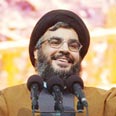
Success for Hizbullah
Why did most of the terrorists escape altercation with IDF?
After all, a force lying in ambush is supposed to be in possession of several advantages: preparedness, the element of surprise, and the ability to open fire first.
And how is it that further Israeli soldiers were hit by Hizbullah shelling, which resulted in the death of an IDF soldier, if the northern front is said to be in state of readiness, with heavily fortified bases?
It is possible that these questions have good answers, but we did not receive such answers on Wednesday.
In reality, despite the big words of a senior IDF officer who claimed that "Hizbullah was caught with its pants down," the Shiite terror group can claim success which has boosted its morale in its confrontation with the IDF.
It seems that Hizbullah is remarkably lucky. But in the type of war that is taking place in the north, which is mostly based on perception and morale boosters, luck has an important part to play.
It is doubtful whether Israel's highest decision-making level has fully understood Hizbullah's motivations. In recent months, Hizbullah's influence over terror activities in the territories has dissipated.
IDF commanders no longer repeat the often said view that were it not for Qais Ubaid, the Hizbullah operative responsible for funding and carrying out terror attacks in the West Bank, quiet would prevail.
Nasrallah holds both ends of rope
Iran and Syria, Hizbullah's two patrons, are playing a complex game with the West and the United States, and our interpretation of Hassan Nasrallah's actions are too simplistic.
If there was a significant intention for Hizbullah's intrusion into Israel on Wednesday, it is doubtful whether the IDF fully comprehends it.
Hizbullah has recently scored a big victory in the Lebanese elections. Its seems fair to assume that its electoral success has intensified Hizbullah's internal conflict – should it become an internal Lebanese political party that operates in the political sphere only, or is it fighting a front in an Islamic war against Israel.
Until now, Nasrallah has skillfully held both ends of the rope. It could well be that the need to decide between these two directions was the main cause for the organization's provocation against Israel.
The significance of all this is that it is difficult to choose the appropriate response, if a full analysis of the opponent's motives does not take place.
Options like striking at Lebanon's infrastructure help to alleviate the anger, but they only result in positive consequences if Syria can be detected behind Hizbullah's actions (and Syria's influence in Lebanon is not what is used to be).
It's not clear whether Israel, with all her intelligential pretensions, is able to fully decipher this. In the meantime, she is not gaining unequivocal victories in the one place that does not have question marks - on the battle field.










